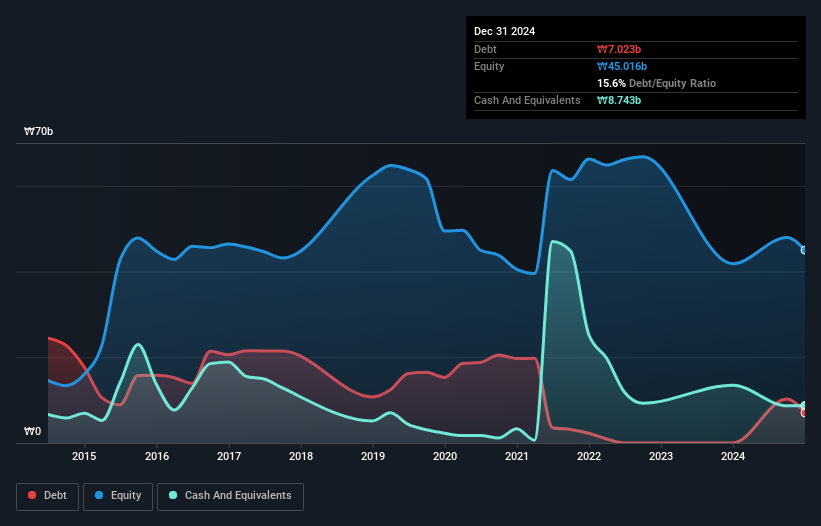- South Korea
- /
- Specialty Stores
- /
- KOSDAQ:A069920
Health Check: How Prudently Does Exion Group (KOSDAQ:069920) Use Debt?
Howard Marks put it nicely when he said that, rather than worrying about share price volatility, 'The possibility of permanent loss is the risk I worry about... and every practical investor I know worries about.' It's only natural to consider a company's balance sheet when you examine how risky it is, since debt is often involved when a business collapses. We can see that Exion Group Company Limited (KOSDAQ:069920) does use debt in its business. But the more important question is: how much risk is that debt creating?
When Is Debt A Problem?
Generally speaking, debt only becomes a real problem when a company can't easily pay it off, either by raising capital or with its own cash flow. Ultimately, if the company can't fulfill its legal obligations to repay debt, shareholders could walk away with nothing. While that is not too common, we often do see indebted companies permanently diluting shareholders because lenders force them to raise capital at a distressed price. Having said that, the most common situation is where a company manages its debt reasonably well - and to its own advantage. The first step when considering a company's debt levels is to consider its cash and debt together.
How Much Debt Does Exion Group Carry?
You can click the graphic below for the historical numbers, but it shows that as of December 2024 Exion Group had ₩7.02b of debt, an increase on none, over one year. But on the other hand it also has ₩8.74b in cash, leading to a ₩1.72b net cash position.

How Healthy Is Exion Group's Balance Sheet?
Zooming in on the latest balance sheet data, we can see that Exion Group had liabilities of ₩12.3b due within 12 months and liabilities of ₩864.2m due beyond that. On the other hand, it had cash of ₩8.74b and ₩13.0b worth of receivables due within a year. So it actually has ₩8.66b more liquid assets than total liabilities.
This short term liquidity is a sign that Exion Group could probably pay off its debt with ease, as its balance sheet is far from stretched. Simply put, the fact that Exion Group has more cash than debt is arguably a good indication that it can manage its debt safely. There's no doubt that we learn most about debt from the balance sheet. But you can't view debt in total isolation; since Exion Group will need earnings to service that debt. So when considering debt, it's definitely worth looking at the earnings trend. Click here for an interactive snapshot .
See our latest analysis for Exion Group
Over 12 months, Exion Group reported revenue of ₩4.8b, which is a gain of 3.8%, although it did not report any earnings before interest and tax. We usually like to see faster growth from unprofitable companies, but each to their own.
So How Risky Is Exion Group?
Statistically speaking companies that lose money are riskier than those that make money. And we do note that Exion Group had an earnings before interest and tax (EBIT) loss, over the last year. And over the same period it saw negative free cash outflow of ₩19b and booked a ₩17b accounting loss. Given it only has net cash of ₩1.72b, the company may need to raise more capital if it doesn't reach break-even soon. Overall, its balance sheet doesn't seem overly risky, at the moment, but we're always cautious until we see the positive free cash flow. When analysing debt levels, the balance sheet is the obvious place to start. However, not all investment risk resides within the balance sheet - far from it. Be aware that Exion Group is showing 5 warning signs in our investment analysis , and 3 of those don't sit too well with us...
If, after all that, you're more interested in a fast growing company with a rock-solid balance sheet, then check out our list of net cash growth stocks without delay.
Valuation is complex, but we're here to simplify it.
Discover if Exion Group might be undervalued or overvalued with our detailed analysis, featuring fair value estimates, potential risks, dividends, insider trades, and its financial condition.
Access Free AnalysisHave feedback on this article? Concerned about the content? Get in touch with us directly. Alternatively, email editorial-team (at) simplywallst.com.
This article by Simply Wall St is general in nature. We provide commentary based on historical data and analyst forecasts only using an unbiased methodology and our articles are not intended to be financial advice. It does not constitute a recommendation to buy or sell any stock, and does not take account of your objectives, or your financial situation. We aim to bring you long-term focused analysis driven by fundamental data. Note that our analysis may not factor in the latest price-sensitive company announcements or qualitative material. Simply Wall St has no position in any stocks mentioned.
About KOSDAQ:A069920
Exion Group
Operates in the fashion business in South Korea, China, the United States, Japan, and internationally.
Excellent balance sheet with moderate risk.
Market Insights
Community Narratives




